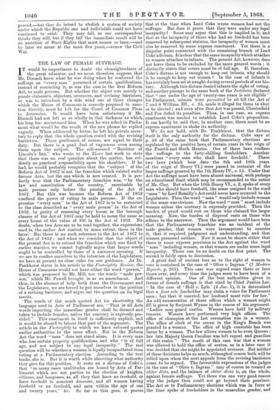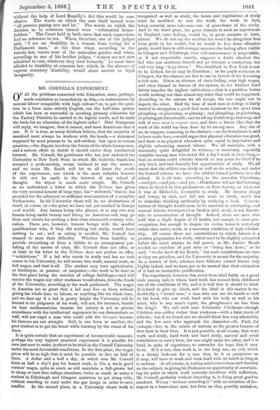THE LAW OF FEMALE SUFFRAGE.
iT would be impertinent to doubt the clearsightedness of the great educator, and we must therefore suppose that Mr. Disraeli knew what he was doing when he conferred the suffrage on "every man" possessed of certain qualifications, instead of restricting it, as was the case in the first Reform Act, to male persons. But whether the object was merely to puzzle claimants, objectors, overseers, and revising barristers, or was to introduce by a side wind one of those changes which the House of Commons is scarcely prepared to sanc- tion directly, must be left for the Court of Common Pleas to determine. It would have been satisfactory if Mr. Disraeli had not left us so wholly in that darkness to which his leap has accustomed him. When he was asked in Parlia- ment what would be the result of the new phrase he replied vaguely. When addressed by letter, he left his private secre- tary to reply that the whole question rested with the revising barristers. These gentlemen, of course, are equal to their duty. But there is a good deal of vagueness even among them upon the subject. The self-assured "Barrister of Lincoln's Inn," who wrote to the Times last week to state that there was no real question about the matter, has evi- dently no practical responsibility upon his shoulders. If he had, he would probably recognize that the " subject " of the Reform Act of 1867 is not the franchise which existed under former Acts, but the one which is now created. It is per- fectly true that the Parliamentary franchise was, "by the law and constitution of the country," exercisable by male persons only before the passing of the Act of 1867. But this was because the Reform Act of 1832 confined the power of voting to male persons. If the ex- pression "every man" in the Act of 1867 is to be restricted to the class described as "every male person" in the Act of 1832, by parity of reasoning every house in the borough clauses of the Act of 1867 may be held to mean the same as every house of the value of 10/. in the Act of 1832. No doubt, when two Acts are to be read together, the expressions used in the earlier Act control, to some extent, those in the later. But there is no such reference in the Act of 1867 to the Act of 1832 ; and when we consider that the object of the present Act is to extend the franchise which was fixed by earlier statutes, we cannot logically argue that larger words ought to be controlled by those of a narrower meaning. If we are to confine ourselves to the intention of the Legislature, we have at present no clear rules for our guidance. As Dr. Pankhurst states in his article in the Fortnightly Review, the House of Commons would not have either the word "person," which was proposed by Mr. Mill, nor the words "male per- son," which Mr. Powell brought in as an amendment. And thus, in the absence of help both from the Government and the Legislature, we are forced to put ourselves in the position of a revising barrister, and argue out the question on its legal merits.
The words of the much quoted Act for shortening the language used in Acts of Parliament are, "That in all Acts words importing the masculine gender shall be deemed and taken to include females, unless the contrary is expressly pro- vided." This enactment in itself is sufficiently explicit, and it would be absurd to labour that part of the argument. The article in the Fortnight& to which we have referred quotes earlier authorities to the same effect. But in the Reform Act the word " man " does not stand alone. It is every man who has certain property qualifications, and who "is of full age, and not subject to any legal incapacity." The real question will be whether a woman is legally incapacitated from voting at a Parliamentary election. According to the text books, she is. But it is worth while observing what authority they give for this position. It rests on a dictum of Coke's, that "in many cases multitudes are bound by Acts of Par- liament which are not parties to the election of knights, citizens, and burgesses, as all they that have no freehold, or have freehold in auncient demesne, and all women having freehold or no freehold, and men within the age of one and twenty years," Sze. So far as this goes, it proves
that at the time when Lord Coke wrote women had not the suffrage. But does it prove that they were under any legal
'incapacity Some may argue that this is implied in it, and that as the incapacity of those who had no freehold has been removed by subsequent statutes, the incapacity of women mast also be removed by some express enactment. Yet there is a singular point connected with the remaining branch of Lord Coke's dictum. It is clear that the same incapacity which attaches to women attaches to infants. The present Act, however, does not leave them to be excluded by the more general words ; it distinctly states that voters must be of full age. If, therefore, Coke's dictum is not enough to keep out infants, why should it be enough to keep out women ? In the case of infants it has certainly been set at naught during several periods of our his- tory. Although this dictum denied infants the right of voting, and another passage in the same book of the Institutes declared that "one under the age of twenty-one years is not eligible" for Parliament, minors were permitted to sit till the Act of 7 and 8 William III., c. 25, made it illegal for them to elect or be elected ; and even after that Act was passed, Chesterfield and Fox defied its penalties. Thus, in one case, an express enactment was needed to establish Lord Coke's proposition. It can hardly be said that, in another case, there must be an express enactment to shake its authority.
We do not hold, with Dr. Pankhurst, that the dictum itself is the only authority for the dictum. Coke says at p. 48 of the same book that Parliamentary elections are regulated by the positive laws,of certain years in the reign of the Fourth and Sixth Henries. One of these laws confines the suffrage to the forty-shilling freeholders. Another mentions "every man who shall have freehold." These two laws (which bear date the 8th and 10th years of the reign of Henry VI.) were passed in restraint of the larger suffrage granted by the 7th Henry IV., c. 15. Under that Act the suffrage must have been almost universal, with perhaps an educational limit which may be recommended to the notice of Mr. Clay. But when the 10th Henry VI., c. 2, spoke of every man who should have freehold, the sense assigned to the word "man" by Lord Romilly's Act could never have occurred to the Legislature. Then the word " man " would only include woman if the sense was obvious. Now the word "man" must include woman unless the contrary is expressly provided. Then the burden of proof would rest on those who claimed the larger meaning. Now, the burden of disproof rests on those who adhere to the narrower. Then the argument would have been that the Parliamentary franchise was an incident of the male gender, that women were incompetent to exercise it, that it required judgment and understanding, and that women possessed neither. Now it must be shown either that there is some express provision in the Act against the word " man " including women, or that women are under some legal incapacity. There can be no doubt on the first point. The second is fairly open to discussion.
A great deal of curious lore as to the right of women to vote is contained in the case of "Olive v. Ingram" (7 Modern. Reports, p. 263). This case was argued some three or four times over, and every time the judges seem to have been of a different opinion. One of the best authorities given in favour of female suffrage is that cited by Chief Justice Lee. "In the case of 'Holt v. Lyle' (4 Jac. 1), it is determined that a ferns sole freeholder may claim a voice for Parliament men ; but that if married, her husband must vote for her." An odd enumeration of those offices which a woman might fill is given by Serjeant Wynne in the course of his argument. "Ladies may guard castles. Women have held by military tenures. Women have performed very high offices. The office of champion at the last coronation was in a woman. The office of clerk of the crown in the King's Bench was granted to a woman. The office of high constable has been borne by a woman. The law allows women to be even Queens ; her late Majesty Queen Caroline was left regent and guardian of this realm." The result of this case was that a woman was allowed to hold the office of sexton, as in a later case it was decided that she might be appointed overseer. But neither of these decisions helps us much,.althoughof course both will be relied upon when the next appeals from the revising barristers come to be argued. The favourable expressions of the judges in the case of "Olive v. Ingram" may of course be treated as obiter dicta, and the balance of obiter dicta is, on the whole, against female suffrage. Yet there was one very good reason why the judges then could not go beyond their province. The Act as to Parliamentary elections which was in force at the time spoke of freeholders in the masculine gender, and
without the help of Lord Romilly's Act this would be con- clusive. The words on which the case itself turned were "all persons paying scot and lot." The words on which the decision as to overseers turned were "substantial house- holders." The Court held in both cases that such expressions had no reference to sex. When, therefore, one of the judges said, "I see no disability in a woman from voting for a Parliament man," at the time when, according to the statute law, voters were of the masculine gender, and when, according to one of his brother judges, "women are not now admitted to vote, whatever they were formerly," he must have alluded to disability at common law, which, in the absence of express statutory disability, would alone answer to legal incapacity.































 Previous page
Previous page